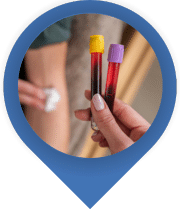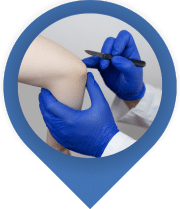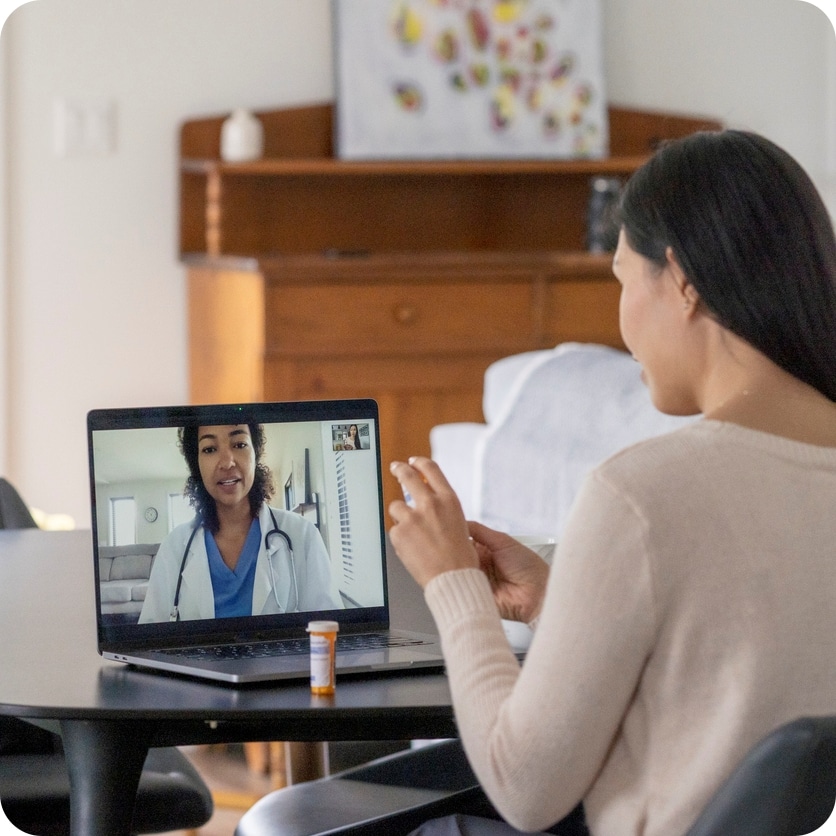The Latest Healthcare News
Check out our blog to learn more from our team about the latest medical advancements, health tips, and primary care news.

You’re washing dishes when a glass accidentally breaks in your hand, leaving a deep cut on your finger, or maybe you’re getting out of the car and bang your head on a sharp corner of the door. At AllCare, we’re here to treat all your cuts, small lacerations, and laceration wounds. Our skilled professionals provide comprehensive laceration care for non-life-threatening injuries in a convenient, walk-in, no-appointment-necessary immediate care clinic.
Minor cuts are a fact of life. However, some cuts, or types of lacerations, are more severe and require medical attention to avoid infection or other complications. At AllCare, our dedicated team of immediate care physicians is here to make your treatment process as smooth as possible. We take a comprehensive approach to laceration care, from prescribing medications to stitching up your wound with sutures. We’re committed to ensuring you get the best care possible for your laceration to address your specific wound care needs. When treating a wound, time is of the essence; that’s why AllCare offers convenient wound evaluation and care in one convenient location.
Please note: If your wound is deep and you can see the underlying muscles or bone, call 911 or visit your local emergency room.
Taking the right steps after a wound is treated can significantly impact how well and how quickly it heals. Proper wound aftercare not only helps in avoiding complications but also minimizes the risk of scarring. Here’s what you need to do to ensure your wound heals efficiently and safely:

Our team will examine your wound and discuss your medical history to determine if you have any underlying medical conditions that could affect your wound healing.

In the case of infection, our team will perform a procedure to treat any abscess or localized infections by making a small incision to drain any accumulated fluid or pus. This wound drainage procedure is vital for promoting healing and infection prevention.

If you have any splinters, debris, or other foreign objects, we will remove them from the laceration wound to prevent infection and promote healing.

Our physicians may apply an antibiotic ointment to your wound to prevent infection. If there’s a high risk of infection if you have diabetes or are immunocompromised, or if your wound is showing signs of an infection, we may also prescribe an oral antibiotic.

In some cases, you may need your wound closed by one of our immediate care doctors. We offer gentle sutures for non-life-threatening lacerations, ensuring precise closure of laceration wounds to promote optimal healing and minimize the risk of a laceration scar.

Suppose you were injured by a rusty object and are unsure when you received your last tetanus shot. In that case, we can provide a booster to prevent a tetanus bacterial infection that causes lockjaw.

Experience the convenience of telehealth appointments at AllCare. Our telemedicine services are designed to provide you with seamless access to healthcare without the need to leave your home. Whether you need an online doctor’s appointment for immediate or primary care, AllCare’s got you covered. With our online telehealth services currently available to individuals located in Virginia, Maryland, and Washington, D.C., you can connect with our experienced immediate and primary care physicians via secure video calls.
At AllCare, we are expanding our virtual healthcare access to all services previously offered in person. This includes:
Individuals of all ages with a small laceration, scrape, or deep laceration can benefit from our wound care services. Anyone with the following concerns should seek immediate care for wounds:
If you have any concerns about your wound or need additional guidance on care, book an appointment with our wound care specialists at AllCare today.
If your wound is small and barely bleeding, you can treat it at home with an antibiotic ointment and bandage. However, if you continue to bleed after applying firm pressure, have dirt in the wound, were bitten by an animal, have a puncture wound from a rusty object, or have any other concerns, you should seek medical attention. Of course, if you are experiencing profuse bleeding that won’t stop, you should call 911 or visit your nearest emergency room.
Pain, oozing, pus, fever, chills, redness, or inflammation around the wound or sutures are all signs of an infection. You should seek immediate medical attention to help ease your symptoms and treat the infection.
You need to care for your stitches to ensure your wound heals properly. Be sure to follow all instructions your physician gives you, which may include:
Healing time depends on the cause of the wound, the severity of it, and any underlying health conditions you may have. For most healthy people, a laceration should heal within two weeks, but if you have diabetes, are immunocompromised, or have circulation problems, it may take longer.
Immediate care facilities are ideal for treating non-life-threatening lacerations that can’t be treated at home. Red, swollen, painful lacerations, animal bites, and puncture wounds can all be treated at an immediate care center. If you have a deep laceration that exposes bone, are squirting blood, or have a partial or complete amputation, you should visit your closest emergency room.
At AllCare, we’re proud to deliver exceptional primary and immediate care to residents across Virginia, Maryland, and Washington D.C. From bustling city centers to serene suburban neighborhoods, our clinics are strategically placed for your convenience and care. Experience top-tier lacerations & wound treatment in your community with AllCare, where your health is our priority.
Check out our blog to learn more from our team about the latest medical advancements, health tips, and primary care news.
Seasonal Affective Disorder (SAD) represents a significant mental health concern affecting approximately 5% of adults in the United States. This […]
Read More >Mammograms save lives. Early detection of breast cancer through proper screening will give a patient a remarkable 99% five-year survival […]
Read More >Most people are aware that diet, exercise, and genetics affect cholesterol levels. But can stress raise your cholesterol? The answer […]
Read More >Our related healthcare services extend beyond immediate care to include preventive care such as routine physical exams, chronic disease management for conditions like diabetes, and specialty care referrals for more complex health issues.